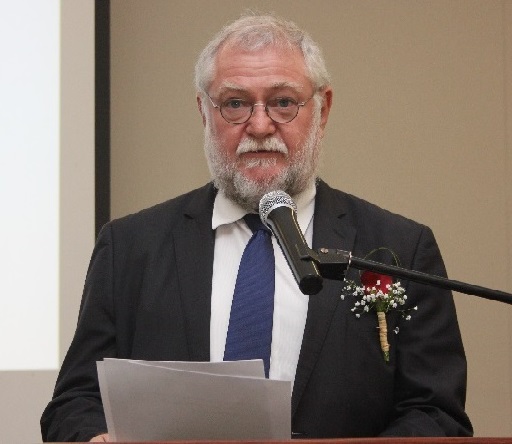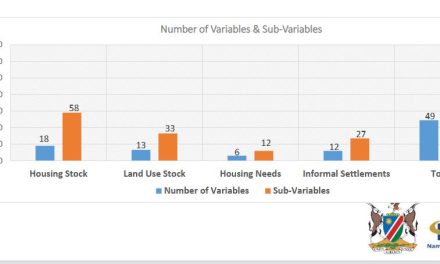
Finance minister tells contractors 180 days overdue is the new normal

The Ministry of Finance reckons the implosion in the construction sector is over despite a further 52% slump in the second quarter of 2017.
“We expect the recessionary pressures to remain on the construction sector for this year, but the worst appears to be over and the sector will improve gradually with better recovery prospects anticipated in 2018 going forward” said the Minister of Finance, Hon Calle Schlettwein last week Thursday when he addressed the Annual General Meeting of the Construction Industries Federation of Namibia.
Assuring the anxious contractors of the government’s goodwill, the minister said that most, if not all of the past financial year outstanding invoices as well as those from Quarter 1 of this year have been honoured through a fast-tracked spending measure.
This still leaves contracters in the lurch as the invoices from the beginning of April, are now 180 days overdue.
However, it can not be argued away that conditions are slowly improving hence the minister stated “on the aggregate, there is optimism that economic activity and outlook for this year is better than a year ago for which the activity rate stood at 1.1%. We anticipate [GDP] growth to be in the range of 1.8% and 2.3% for this year.”
The minister divulged that the government is actively pursuing alternative financing mechanisms to keep the major infrastructure projects going and funded.
“On the public sector front, we will roll-out interventions to revive the pace of activity on some of the on-going major capital projects, while opening up opportunities for new ones. This will be done through harnessing alternative means of financing,” he said.
Levelling some criticism against the industry, Schlettwein told the meeting that the government has invited proposals for local procurement and that these are now overdue. At the same time he hinted at the enormous drain inept and corrupt officials in State-owned Enterprises put on the national economy.
“We should make concerted efforts to bring about effective SOE reforms and better utilization of state assets as a means of enhancing investment in infrastructure development, and more importantly, the Public Procurement Act offers opportunities for local procurement and tendering. This policy space should be utilized optimally to the benefit of the local economy” he said.
On reliable funding mechanisms, he said “I have already announced the planned establishment of an Infrastructure Fund at the Development Bank of Namibia that will be ring-fenced to finance the completion of on-going capital projects and as a conduit for financing long-term infrastructure projects. This fund will run in parallel with the African Development Bank’s infrastructure loan facility.”
He further stated “We have progressed on assessing Public Private Partnership options for some potential infrastructure projects. We will aggressively seek to harness PPP opportunities where the potential exist, while keeping fiscal risks in check.”
Telling the builders about Domestic Asset Requirements to allay their worst fears, the minister said “amendments to domestic asset requirements from the current minimum threshold of 35% to 45% by October 2018 will release substantial amount of money into the economy. The private sector should work together with the government to identify listed and unlisted investment opportunities and the Ministry of Finance avails itself of such result-oriented engagements.”
Acknowledging to the meeting that the government is very concerned about the condition of the construction sector, Schlettwein said “This is reflective of the difficulties of adjusting to boom-bust cycles and calls for measures to align business strategy at the micro level, and timely implementation of alternative supportive measures at the macro level. On its part, the government wishes to proceed with putting into action the interventions to support activity in the construction sector within the framework of medium-term budgetary spending restraint and structural policy reforms to complement the national budget and further unlock investment opportunities in the economy.”











































